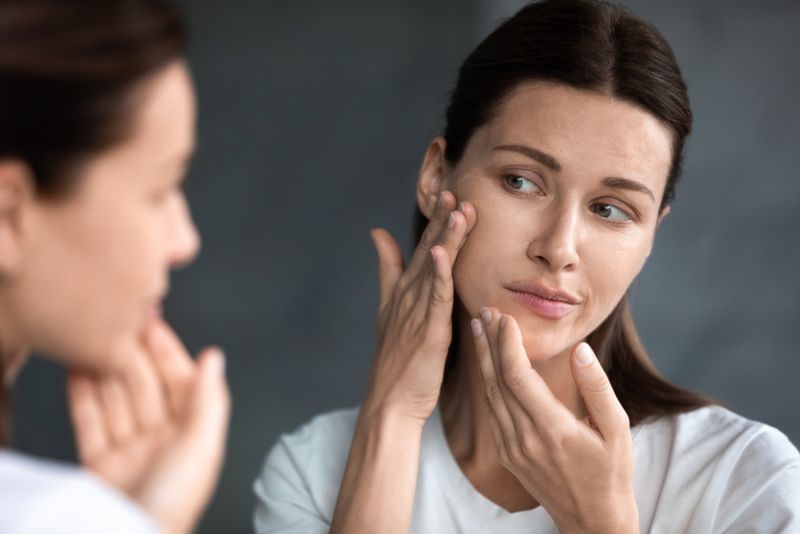Polycystic ovary syndrome (PCOS) is a condition that can affect women of reproductive age. Women with PCOS experience a hormonal imbalance that can cause irregular, infrequent, or prolonged periods, acne, increased facial and body hair, and sometimes infertility.
How does PCOS impact the body?
When a woman has PCOS, her ovaries produce unusually high levels of androgens. Androgens are often referred to as male sex hormones, but they are present in women as well, though normally in small amounts. The excess production of androgens in women with PCOS creates a hormonal imbalance that interferes with the menstrual cycle because it hinders the growth and release of eggs from the ovaries (ovulation). Sometimes, women with PCOS develop fluid-filled sacs (cysts) on their ovaries. However, not all women with PCOS develop these cysts.
What are the symptoms of PCOS?
The following are the most common symptoms of PCOS:
- Irregular, infrequent periods that can be abnormally heavy
- Increased facial and body hair
- Thinning hair on head or male-pattern baldness
- Severe acne
- Changes in mood
- Weight gain
- Darkening of skin (especially on neck, armpits, and/or groin)
- Excess skin or skin tags (usually on the neck or armpits)
What causes PCOS?
The cause of PCOS is unknown, but heredity seems to play a role, so women who have a close female relative with PCOS are more likely to have PCOS themselves. Excess insulin and excess androgen may also contribute to the hormonal imbalance that causes PCOS.
What possible complications are associated with PCOS?
In some cases, PCOS can cause or contribute to complications such as infertility, type 2 diabetes and/or gestational diabetes, pregnancy-related high blood pressure, premature birth, miscarriage, metabolic syndrome, inflammation of the liver, or uterine bleeding that is out of the ordinary. There are often metabolic consequences associated with PCOS like insulin resistance and obesity, so providers may focus on these areas when treating PCOS.
How is PCOS treated?
Unfortunately, at this point there is no cure for PCOS. Nevertheless, there are ways to manage one’s symptoms and address specific problems associated with PCOS like infertility or excessive hair growth if a woman wishes to do so. From this standpoint, treatment for PCOS usually involves lifestyle changes and certain medications that support ovulation and reduce the detrimental effects of the hormonal imbalance.
What can women with PCOS do to manage their symptoms?
Women with PCOS may notice an improvement in their health when eating a balanced diet and getting regular exercise. For those who are overweight, losing weight may also help lessen symptoms. A health care provider may recommend/prescribe birth control pills to women with PCOS who wish to regulate their menstrual cycles, control excessive hair growth, and reduce hormonal acne. Progestin therapy (such as a progestin “minipill” or an IUD containing progestin) can also help women regulate their periods and protect against endometrial cancer. There are a few different medications that women can take to lower their insulin and promote ovulation, which can be discussed with a health care professional. Finally, electrolysis and laser hair removal are two options for removing unwanted facial hair.
Resources:
Mayo Clinic. (2020, October 3). Polycystic ovary syndrome (PCOS). https://www.mayoclinic.org/diseases-conditions/pcos/symptoms-causes/syc-20353439
Office on Women’s Health. (2019, April 1). Polycystic ovary syndrome. https://www.womenshealth.gov/a-z-topics/polycystic-ovary-syndrome
WebMD. Medically reviewed by Neha Pathak, MD. (2021, September 13). Polycystic ovary syndrome (PCOS). https://www.webmd.com/women/what-is-pcos
You may also be interested in...
Other Popular Articles

What Is Jelqing, and Does It Actually Work?
The term “jelqing” refers to a set of penis stretching exercises that some believe can make the penis bigger. Although the practice has gained attention and popularity in blogs and internet forums in recent years, there is no scientific evidence that it is an effective way to permanently increase the size of one’s penis. In fact, in some cases, jelqing may actually cause damage to the penis, so it is a good idea to get all the facts before setting off to try it.

What Is Sensate Focus and How Does It Work?
Sensate focus is a technique used to improve intimacy and communication between partners around sex, reduce sexual performance anxiety, and shift away from ingrained, goal-oriented sexual patterns that may not be serving a couple.

What Is the Average Penis Size?
If you have ever wondered how your penis compares to others in terms of size, you are not alone. Many men are curious to know how their penises stack up compared to the average. Unfortunately, general curiosity can sometimes give way to full-on obsession and anxiety about penis size. This can be an unhealthy and often unnecessary fixation, especially because most men who think their penises are too small have perfectly normal-sized penises.

Can Sex Reduce Menstrual Cramps?
The SMSNA periodically receives and publishes ‘guest editorials.’ The current article was submitted by Mia Barnes, a freelance writer and researcher who specializes in women's health, wellness, and healthy living. She is the Founder and Editor-in-Chief of Body+Mind Magazine.
Having sex while you experience menstrual cramps is healthy and can provide significant benefits. While it might not be the first activity that comes to mind when your PMS or period cramping begins, many people enjoy sex to reduce menstrual cramps, experience increased pleasure and benefit from other advantages. Learn more about having sex while menstrual cramps are happening and how it can help your body.

What Is Edging and Why Do People Do It?
Edging is the practice of stopping sexual stimulation before reaching orgasm to prolong a sexual experience. The term stems from the concept of approaching the metaphorical “edge” of orgasm but stopping before going over the edge.

The Effect of Regular Aerobic Exercise on Erectile Function
Erectile dysfunction (ED) is the inability to achieve or maintain an erection sufficient for satisfactory sexual activity. As men get older, their erectile functioning may naturally decline due to changes in testosterone levels, cardiovascular functioning, and the potential development of other chronic medical conditions that become more common with age.


